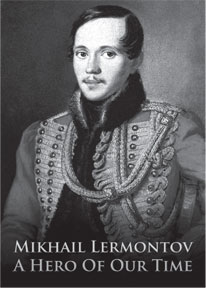Mikhail Lermontov’s three letter riddle to posterity
By Dilshan Boange
The cultural and literary richness of Tsarist Russia, before the
formation of the USSR, was epitomised by several prominent literary
figures amongst whom, counts the great Russian poet Mikhail Lermontov.
 Poets, like any other great artists, leave through the legacy of
their work unanswered questions that riddle generations who become
captivated by their work and genius and wish to fully understand the
mind, and even the life of the poet through their works. This article is
a small glimpse at one such riddle left behind by Lermontov which was
solved by a Soviet scholar of letters more than a century after the
death of the great poet. Poets, like any other great artists, leave through the legacy of
their work unanswered questions that riddle generations who become
captivated by their work and genius and wish to fully understand the
mind, and even the life of the poet through their works. This article is
a small glimpse at one such riddle left behind by Lermontov which was
solved by a Soviet scholar of letters more than a century after the
death of the great poet.
‘The N. F. I Riddle’
The account of the adventure, the ‘textological’ and archival
research and the travels undertaken to locate material that could lend
to solve the puzzle is found in a book published by Progress Publishers
named His Nameless Love: Portraits of Russian Writers (1974). The
journalistic treatise that narrates the research is titled The N. F. I
Riddle. It is written by the researcher himself, Irakli Andronikov; and
is accredited as an English translation from the Russian by Katherine
Judelson.
The researcher
Andronikov is introduced to the reader as a scholar of literature
specialising in modern literary studies holding a doctorate in Philology
with a reputation for having authored fascinating studies about literary
figures such as Alexander Pushkin and Mikhail Lermontov.
A figure of diverse talents, being an actor, historian, and literary
critic the introduction says the following about Andronikov in
connection with his work as a literary researcher –“Irakli Andronikov is
the creator of the “literary research story”, which presents hunts in
archives as adventures quite on par with the gold-digging in Jack
London’s Klondike stories.”
Collection of love poems
Written in the first person narrative voice, the essay is an
engrossing read that begins from the point the writer is thrust to a
quest to discover the identity of a lady to whom Lermontov had dedicated
a couple of poems.
The only clue as to whom the verses were dedicated were three
initials –N. F. I. This had developed at the point when the writer
Andronikov had been involved in preparing a new edition of Lermontov’s
complete works.
These love poems had clearly shown that the Russian poet had been the
sad but rather common victim of unrequited love. Although at the outset
the poems had been only four, the subsequent research had shown that
there were thirty poems in all written by Lermontov as a teenager of
seventeen years.
The essay by Andronikov itself begins with a poem of six lines from
this collection, which is produced as follows –
“So–I may not pronounce your name.
To write it, even, is forbidden.
At its familiar sounds a hidden
And half –quenched grief leaps into flame.
Judge then yourself ...how hard it is
To hear that name on others’ lips.”
The love stricken Lermontov
This epigraphic element in the treatise quite captivatingly sets the
reader’s perception about the theme not only from the point of its
thematic thrust in respect of the material the poet left behind for
posterity to decipher, but also the sentimental state that gripped
Lermontov as a love stricken young man.
The research that Andronikov embarks on is not merely a part of his
official work as the narrative shows but an ardent labour driven by his
passion as a literary historian.
Sifting through the material
The author states the following about his first stage of setting down
to work on the matter –“Night after night I spent sitting at my desk
burning the midnight oil as I poured over a volume of Lermontov’s
youthful poems. I read each one with meticulous care, comparing
individual lines as I went.”
 The first point of narrowing down which material to research and
decipher some clues had been by identifying what Lermontov had written
during the period of 1831. The first point of narrowing down which material to research and
decipher some clues had been by identifying what Lermontov had written
during the period of 1831.
One of the works of Lermontov which Andronikov set himself to study
for clues was a play written during the summer of 1831 titled The
Strange Man.
This shows that the researcher presumed that as a writer Lermontov
given the emotional state he was in, could give clues to the riddle in
writings other than what was dedicated to his love interest, which were
the poems.
One could by looking at this line of investigation deduce that a
writer would very likely draw on his own life experiences to craft his
creative writings and thereby a textual investigation of a piece of
creative writing by an author could allow insight to decipher
biographical elements which the author may even consciously encrypt in a
work of fiction.
The play had been of immense value to Andronikov which says that the
protagonist in the play is ‘betrayed’ by his love, which is later learnt
to reflect what had transpired with his love interest –N. F. I.
Lermontov becomes ‘the forgotten’
She had initially shown some interest Lermontov who was a year
younger than her, but later had upon being carried away by her love for
someone else completely forgotten him. Interestingly Andronikov says
that it was after Lermontov learns that he had been rejected by N. F. I,
the writing of the play begins.
By these deductions the researcher arrives at the conclusion that a
certain poem titled –The Eleventh Day of June, 1831 was surely another
poem dedicated to his unnamed love. The beautiful seven line verse flows
thus –
When I am dust, amazed society,
Although it understands them not, will bless
My dreams; and you will share my immortality,
My Angel: for my love will surely give
You life afresh; and you and I shall live:
Your name and mine, both spoken in one breath...
For why should they be parted –even in death?
The final discovery
The fascinating search fuelled by Andronikov’s passions to discover
an aspect of Lermontov’s life and work which had escaped historians
drives the scholar to intensely research the life of the great Russian
poet and his social circles, visit museum archives, search through card
indexes of families of the old Russian nobility and finally arrive at
discovering unpublished poems of Lermontov that had survived in an old
autograph album belonging to one Maria Zhedrinskaya, which become the
final conclusive evidence to establish the identity denoted by the three
initials. The name of the unnamed young lady who became a love interest
for Lermontov and stirred him to compose no less than thirty poems to
her, is revealed as–Natalya Fyodorovna Ivanova, a daughter of a family
named Ivanov who had been family friends of Lermontov’s family. She had
later married a man named Nikolai Obreskov who had been a decorated
military figure and later in his career had entered the civil service in
the chancellery of the Governor of a place called Kursk.
One of the major problems Andronikov had to contend with was tacking
down the right Natalya Fyodorovna Ivanova as the researcher narrates it
had been the name of more than one lady who were of similar social
standing and within similar circuits of privileged society. The
perseverance and dedicated resolve of Irakli Andronikov finally did
solve the riddle left behind by Lermontov revealing the accurate
identify of his secret love as Natalya Fyodorovna Ivanova and also
resulted in a number of poems that had been unpublished at the time to
find their place in the cannons of Russian literature.
A riddle solved and a name eternalised
The labours of love Lermontov were driven to, surely assured, with
the passage of time, an edification of his love for ‘N. F. I’, through
his expressions of verse. But Lermontov himself in the final poem
composed to her upon being disenchanted as to how his love for her reaps
no fruition, asks her whether the only thing he gained out of his
labours was to be the composer of beautiful verse and thereby gain fame?
That part of the poem is produced as the following excerpt –
Perhaps the moments squandered
At your feet served but to estrange
Me from the Muse. And what, I wonder,
Did you e’er give me in exchange?
In may be, in high powered poetry,
I might have written wondrous verse
And so gained immortality?
The rewards of true artists
The words of poets whose verse are treasured through generations for
the beauty and depth they possess do inspire and nourish the senses of
readers who are far removed from the times and milieus of the poets
themselves, thus they truly do find immortality long after their
physical beings have proven mortal. Thus it can be said of any artist
whose true pursuit is to capture the truth of his emotions and the
beauty felt thereby, that –he who bequeaths beauty to the world inherits
immortality.
|



